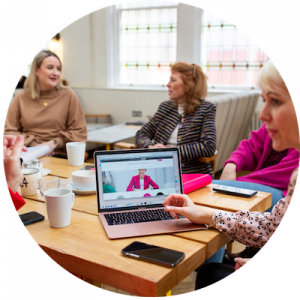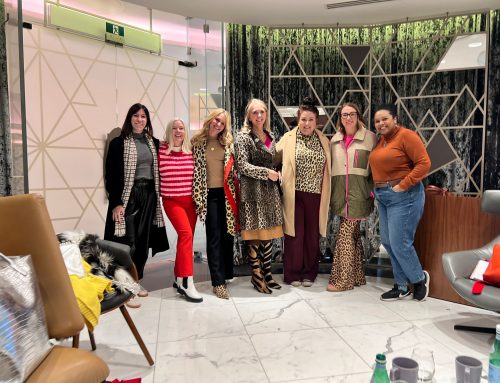 The role that fashion plays in the workplace is interesting to consider.
The role that fashion plays in the workplace is interesting to consider.
The question is: Can how you dress affect your success in the workplace? Dressing for work can be tricky. If we were to follow current fashion ‘trends’ we would be wearing bright red and favouring off-the-shoulder and sheer dresses. Possibly not the average work attire and certainly a sheer dress could be problematic in the office.
My name is Emmeline Stevens and as a former commercial fashion stylist, I am all too aware of the term ‘Trend’. I no longer work in the commercial styling world so I can confidently state that I am not fond of fashion ‘trends’. I think they are unhelpful and limiting. I believe it is important to dress for you and forget about trends. Whilst trends are set to inspire on a regular basis, they offer a high turnover of unnecessary goods. They also add pressure to those who aren’t as inspired; pressure to purchase and pressure to look a certain way. For me, fashion is about fun, freedom and the ability to portray your real personality. That is why I set up The Image Consulting Company where I train individuals to make that change into fashion styling and support everyday people on their fashion journey.
The purpose of clothing can affect how we feel. The work landscape has changed in the last three years, there has been a seismic shift with hybrid working and WFH becoming more prevalent. In 2020 alone, Zoom’s customer base grew by 470.33% for example. This gave rise to reports of meetings conducted with suited upper bodies and pyjama-based lower bodies for the screen. The impact on people’s productivity of working in their pyjamas is hard to quantify. During COVID, we were unable to separate our home and workspaces. For many, getting dressed for work helped them to get into that mindset and made them feel like they were separating their home and workspaces which was important for them psychologically. Another important consideration is the rise of the tech sector and Silicon Valley which is largely made up of millennials heading up companies whose work uniforms consist of jeans and hoodies. This shows that being smart does not necessarily signal success. Here in the slightly more formal UK, this relaxation of work dress is trickling through into certain sectors and even those sectors that still demand a suit probably do not require a tie alongside.
 Wearing certain clothing for a specific activity or situation can make us feel prepared and capable. An example of this is how dressing professionally for a job interview can boost your confidence and give you that sense of readiness which we all need going into those situations. In terms of dressing for success, However, It is important to consider what clothes mean to us as individuals. Our clothes can have a significant impact on how we feel, both physically and psychologically. What you wear can have a profound impact on your self-confidence. When you wear clothing that makes you feel attractive and stylish, you are more likely to feel confident and self-assured. This boost in self-esteem can influence your overall mood and behaviour. What you wear is also a form of self-expression. It allows you to convey your identity, values, and personality. When you wear clothes that align with your self-image, it can make you feel more authentic and content. The colours and styles of clothing can influence our moods and emotions. Bright, vibrant colours may uplift our spirits, while muted or dark colours can convey a more sombre mood. For example, wearing a favourite colour can boost your mood and make you feel happier, which could translate to the workplace meaning greater productivity. It therefore follows that what you wear to work can have a positive effect on what you deem as your success.
Wearing certain clothing for a specific activity or situation can make us feel prepared and capable. An example of this is how dressing professionally for a job interview can boost your confidence and give you that sense of readiness which we all need going into those situations. In terms of dressing for success, However, It is important to consider what clothes mean to us as individuals. Our clothes can have a significant impact on how we feel, both physically and psychologically. What you wear can have a profound impact on your self-confidence. When you wear clothing that makes you feel attractive and stylish, you are more likely to feel confident and self-assured. This boost in self-esteem can influence your overall mood and behaviour. What you wear is also a form of self-expression. It allows you to convey your identity, values, and personality. When you wear clothes that align with your self-image, it can make you feel more authentic and content. The colours and styles of clothing can influence our moods and emotions. Bright, vibrant colours may uplift our spirits, while muted or dark colours can convey a more sombre mood. For example, wearing a favourite colour can boost your mood and make you feel happier, which could translate to the workplace meaning greater productivity. It therefore follows that what you wear to work can have a positive effect on what you deem as your success.
I set up a training academy, The Image Consulting Company, for people to learn how to empower and help individuals find their style and their personality because I believe the psychological power of clothes on us is overlooked. Many of the people I have trained have come from really different first careers. These individuals wanted to do something different with their lives and are passionate about helping others find their true selves through fashion.
You can dress for success but it does not have to be in the traditional sense. That doesn’t mean donning a tailored suit unless you want to. There are other ways to look smart. Think about what image you want to portray and what items of clothes you have or you like that could help you convey that confidence and image.
You can read the published article on Business Mondays website here




